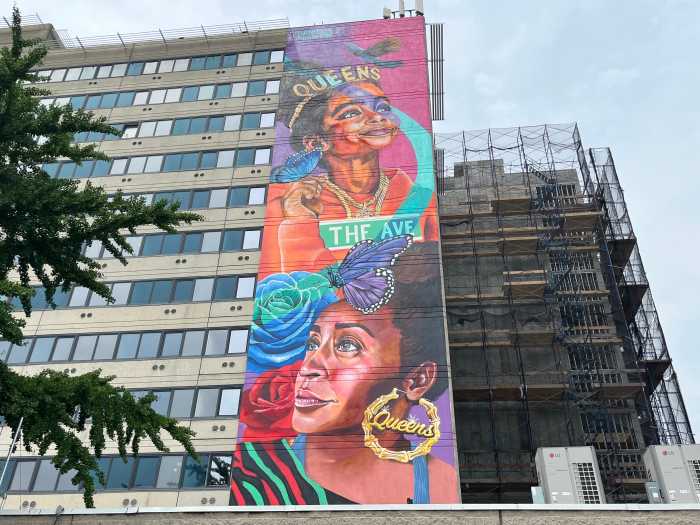On Tuesday, mayoral candidate Mike Tolkin announced he’d be spending a week as a homeless man in City Hall Park. It’s the “Hunger Games” theory of running for mayor. This is how you get media coverage in this town. Tolkin, a 32-year-old entrepreneur, was demolished by Bill de Blasio in the Democratic primary, earning less than 5 percent of the vote. Now he’s back for the general election on a “Smart Cities” ballot line he paid dearly to create.
There’s some precedent for the stunt. In 2013, Democratic candidates for mayor spent a night in NYCHA. Tolkin says he hopes the week will help put “a face on homelessness” for voters, creating the kind of “empathy and compassion” that might lead to change.
By Wednesday afternoon, he had changed locations to a public plaza a few blocks away. It was cooler but the benches were better than they were near City Hall. He wasn’t incredibly mobile. He had pulled his back while “playing fun uncle” with family for the Jewish holidays, but had decided to still go through with the homeless plan. He had an ace bandage on under a T-shirt, longsleeve shirt and two sweatshirts. But his back was not doing well after a night spent first on a bench and then on the ground in the Chambers Street station. He hadn’t had blankets or cardboard, and now he didn’t think he’d be able to carry such items given his aches. But he was smiling, and said the back injury made his homeless experience more akin to what actual homeless New Yorkers might face, with health difficulties on various levels. Plus:
“I feel really gross,” he said.
An outsider with outside the box ideas
The funny thing is that Tolkin’s platform might be even weirder than his homeless stint. In short, he wants to create a non-tax-based revenue stream for NYC by launching NYC Enterprises, a bunch of for-profit companies owned by NYC — an entertainment company, for example, making movies whose profits would go to the city. That and some private-sector magic would fund all sorts of other Big Ideas he’s proposing, from drones-as-buses to huge affordable housing campuses to, for homelessness, brand-new “end-to-end rehab centers.” These centers would offer services from health and child care to vocational training, plus a place to sleep. They’d eventually take the place of city shelters. Oh, and a portion of them would be operated, under some jurisdiction, outside NYC.
Tolkin talks about these ideas with a somewhat loopy zeal. He seems vaguely aware of the legal and political headaches that virtually all of his proposals would cause, and he says he would need help in Albany and has reached out to City Council members about his agenda. One wonders what lesser-developed part of the city would accept a big old utopian homelessness-ending factory when the city can’t keep a couple of down-on-their-luck people in a Maspeth hotel. Tolkin says New Yorkers’ general wariness of homeless shelters comes from knowing that they’re just a stopgap, inadequate solution.
Big thoughts meet cold, hard reality
On one hand, cheers to someone floating the kinds of highly ambitious ideas that might encourage change in how we think about one of the city’s most shameful, intractable problems. The legacy of mayoral difficulty solving this problem for decades is the 60,000 people now living in shelters and at least a few thousand on the streets. Too bad no candidate has floated a realistic, near-term policy that will make a real dent in those numbers. Announcing his attempt in February, de Blasio conceded that he saw no quick end to the problem.
Certainly Tolkin will get an up-close view if he keeps up his challenge this week. Already, he says he’s had trouble finding food (a bakery granted him a nice bag of muffins). The Four Seasons shooed him away late Tuesday night when he tried to warm up. Cops said he couldn’t lie on the uncomfortable park benches Wednesday morning. The hassles will continue until he goes back home.
In the Chambers Street station where Tolkin spent the night, George Bowman, 63, was playing trumpet next to a spot where homeless individuals tend to sleep. He said that he himself had been almost homeless in the past — went to Bellevue Men’s Shelter looking for a spot but there hadn’t been any room. Luckily, his sister let him in. He was still with her, in New Jersey, after losing his job as a computer technician and his apartment in Harlem.
He hadn’t heard of Tolkin but figured that the candidate would definitely learn something on the street. Bowman pointed out that in March, an apparently homeless man had been found dead on the E train coming into this very station. “They don’t treat homeless good out here,” he said.



























